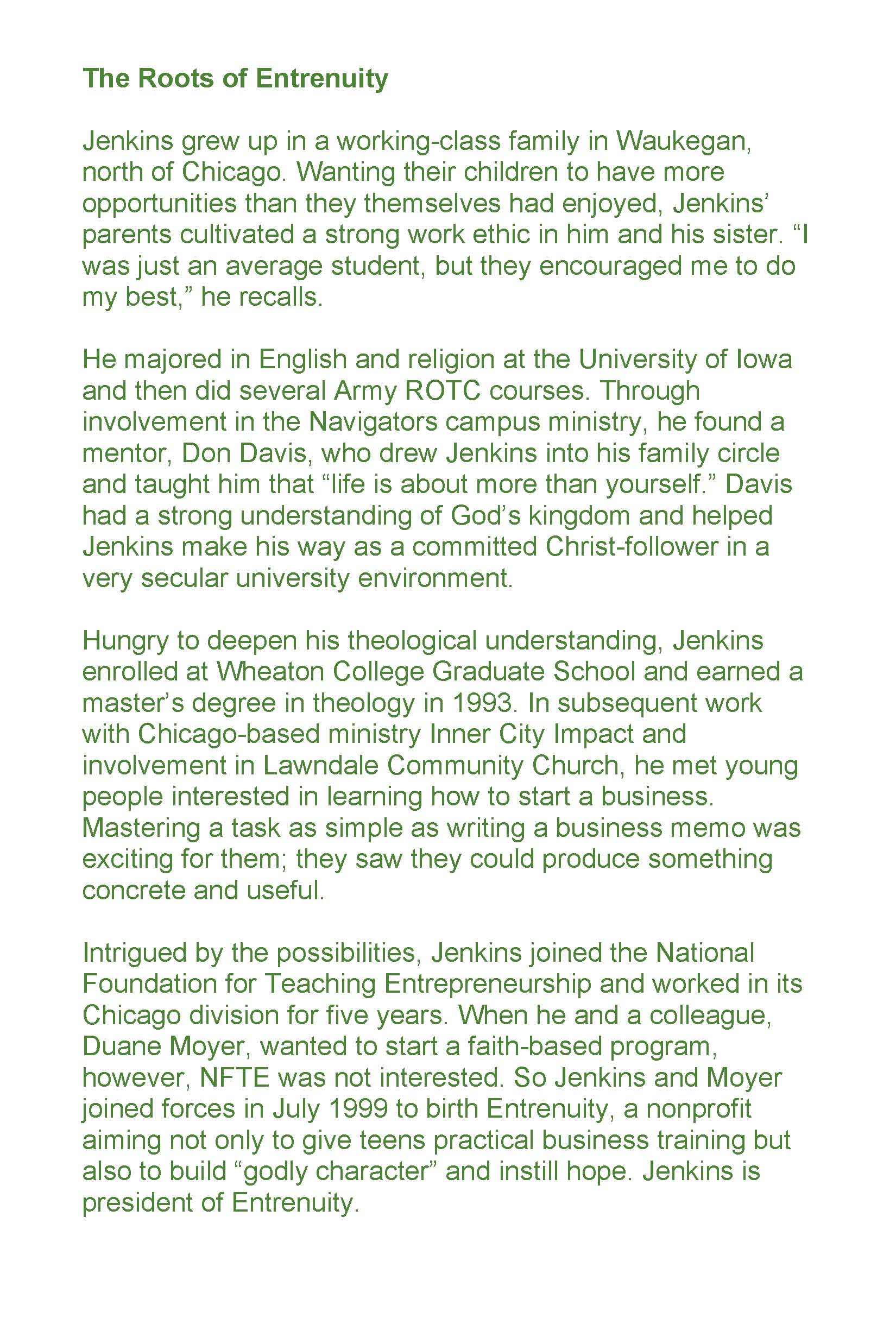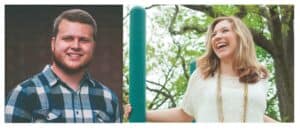“Everyone has a dream. Everyone has ideas.” ~Brian Jenkins, founder and president of Entrenuity
Entrenuity is an innovative ministry focused on empowering young people in inner cities.
“The media tend to focus primarily on the tragic news in urban communities,” Entrenuity founder Brian Jenkins told us back in 2004, “yet there’s so much more happening and such enormous potential.”
We wanted to hear what potential Jenkins had seen realized over the past decade-plus, so we checked in with him to see what Entrenuity has been up to since we’d last spoken.
Thanks so much for speaking with us. We know that Entrenuity has been providing education and opportunity to young people since 1999. What have you all been up to since you last spoke to CSA?
Since I last connected with CSA over 10 years ago, there’s a new thing called “social media”! At that time, we were at the point of trying to determine how we could use what we now know as social media to best distribute information. Also, our funding had dropped in the recession, and we were trying to figure out how to continue to grow as an organization. We didn’t know what the best tool was going to be or how we could leverage these tools for the greatest impact. Now, this many years later, we have created a new business model and have created a tool to introduce these models for ministry in an interactive book called StartingUp Now.
StartingUp Now is a very simple book—less than 99 pages—for a person who has no knowledge about business. We originally created it with youth in mind, but many adults have used it. It’s a low-cost option that helps a person take their business idea from dream phase to launch phase.
We’ve also launched the Skill Center, which is a web-based tool where we do all of the “heavy lifting” for these business start-ups. On Skill Center (which is able to be translated into 64 different languages), people all over the world can access their own portal, view and revise their business plan, get connected to like-minded entrepreneurs and really see their dreams come to fruition at a local and global level. We have trained entrepreneurs in the US, Brazil, and Africa, using our hybrid model that helps nonprofits create program-related income through fee-based services, so that they can be self-sustaining rather than dependent upon donations.
So, since you are now in both the non-profit and the for-profit sector, do you see groups who are both faith-based and non-faith based using this tool?
We see everyone. We see youth, young adults, and adults who are saying, “These principles are not just for children. These are things I’ve always wanted to do as an adult.” We work with people of the Christian faith and other faiths. We have people with MBAs, people who are employed, people who are underemployed, people who have been incarcerated,  and youth who have never been employed but are trying to find the tools to implement their business plan. With our motto—“Dream it, plan it, launch it.” We are opening up our market so that we can have greater impact than the traditional ministry model we have had in the past.
and youth who have never been employed but are trying to find the tools to implement their business plan. With our motto—“Dream it, plan it, launch it.” We are opening up our market so that we can have greater impact than the traditional ministry model we have had in the past.
Given that you are a culturally sensitive organization, what has the feedback been in other countries regarding this business model tool?
We always strive to be very culturally sensitive and aware. When we are able to go into countries like Brazil, Ghana, and Nigeria, we go in with the fundamental principles, but we work with an expert in the area who will make it “culturalized.” So we turn the process over to someone who is an expert in that community in order to make it contextual. Since we are working with people who are both of the faith and not of the faith, what has been amazing about this tool is that we have opened up doors with people we may never have been able to meet through a traditional ministry model. I see business and entrepreneurship as a way to reach people—because most of us have a dream—and help them to see that dream come true.
Many people can see some idea, problem, or situation they would like to see come to fruition in their community. For example, we partner with an organization in Atlanta called American Shea Butter Institute, with Dr. Samuel Hunter, who is an expert in the shea butter industry. This product is vital to the economy of to the western region and eastern coasts of Africa. It’s a locally produced product and usually a women-run business. Yet, because of the culture, women are not necessarily receiving the benefits. We’ve been working with Dr. Hunter and others in Africa to help them develop their ideas, show them they have value beyond what they’ve been told, and help them see how they can make a unique and valuable contribution to their communities. We have opportunities to see women—who are not engaged in traditional business training—overcome their lack of training and know the value of their contributions to their community. So not only are we handling business issues, but also justice issues.
This is why I love being an entrepreneur. There are so many things entrepreneurship allows you to touch and offers more freedom to help. So often our role is just giving these tools and recommendations and then stepping back and giving others the freedom to live into those dreams. Even here in the US, we find the experts to help others take in the information and coach them in applying it for themselves. This is how we do our trainings—experiential and hands-on learning in their cohorts in order to have those cohorts walk away with their own self-identified outcomes.
Tell us about the new initiative you’re in the midst of launching.
It’s called the Entrenuity Capital Matchmaker Fund. We just received a significant investment to launch African American and Latino/a indigenous-led urban ministries. The idea is that we would give—to start—a cohort of about 10 entrepreneurs an opportunity to go through an accelerated process, allowing them to take their idea—either for a business, a social enterprise, or a hybrid ministry model—and in 10-12 months receive some of the best training we can provide. At the end of this time, they will compete for start-up capital to see these dreams come to life. We are moving from the dream phase to the conceptual phase, which we hope to launch in January of 2016. We anticipate the graduation of our first class of CMF Fellows in 2016. You heard it first, CSA!
There are plenty of incubators and accelerators around, but I have no knowledge of any that are restricted to the African American and Latino/a communities. I believe the current model for urban ministries, where the focus is on fundraising, does not work for African American and Latino/a communities. I am finishing up a presentation—based on factors many of my colleagues and I have personally experienced—on how to create indigenous leaders without forcing them to adopt systems that just do not work. A few years ago, I was a part of an article that went to the Huffington Post called “Who Gets the Money” that reflects some of the frustrations I am speaking of, particularly when multi-ethnic groups are not invited to the table of the “evangelical urban ministry industry” (that’s what I call it). There’s a level of transparency, communication, and respect that we are supposed to share as brothers and sisters in Christ that should prevent some of the situations we’ve experienced.
So this accelerator is not bound to the same ministry industry model with the same limited perspectives that my colleagues and I have gone through. I like to say that we’ve discovered as a community that “Saul’s armor does not fit”—referring to when David was headed into battle with Goliath, and Saul tried to force his own armor upon David. Traditional models do not fit. No one told me there were options other than the nonprofit model. Now we are able to say: “You can do good by doing business” and to give real hands-on models that are changing the way we do good and do business in the world. The Lord has gifted us to be problem-solvers, and to be creative, and I think we are standing on the cusp of something really powerful here.
What have you learned by working with so many different communities to help people find their dreams?
That everyone has a dream. We love working with youth because they’re not bogged down with life, but everyone has a dream. I use the same exact tools with every age and group, but with a different delivery or approach depending on who I’m speaking with. We start out—no matter what the age or situation of the group—asking, “What is your big idea?” Everyone has ideas.
Now, how do you take that idea—without life getting in the way—and turn it into something? A third grader’s approach may be simpler than an adult’s, but there’s still an approach. And sometimes, with adults, there are a lot of layers we have to peel back in order to take that dream and figure out the next step. But every group, no matter the age, works through the same strategies to get from the dream phase to the planning phase. In this process we hear folks say: “Wow! What does it actually take for me to move from the dream phase to the plan, and is there a market?” Here people can discover if it’s a business or ministry opportunity, or if it’s really just a hobby. Then, as people discover their business or ministry opportunity, they create a profile on our Skill Center platform and discover connections with others who have also gone from that dream phase to the planning and implementation phase.
What I’ve discovered is that there are the “solvers” and the “squawkers.” I’ve gotten to the place in my 46 years of life where I don’t want to complain about anything anymore without a productive solution to the problem. Many people do not even know the steps to take from going to squawking about an issue to solving it. We want to help people move into that phase.
What’s one of your favorite stories of seeing a dream come to life?
There are so many. My background is in theology, but I took my tool into very different settings—schools, businesses, and prisons—and all of them were able to utilize the same materials. Right now, I’m working with a man who was incarcerated and was involved with gangs for 20 years. He got saved with a local church we work closely with, and he has told me, “Brian, I feel like you’ve written this book for me.” He has told us that we’ve made a tool that even he—who was not highly educated—can understand, and it works for him. Now he’s thinking about how he can share these tools with his family in order for them never to have to come to the prison system, because they have the tools they need to be successful. We just want to be able to unlock the potential people have forgotten they have and provide the opportunities that many under-resourced communities have not had.
If you could communicate to the church at large just one important idea about your experience with Entrenuity, what would it be?
Relationships should be peer-based, rather than benevolence-based. Having a peer-based relationship means we value each other as brothers and sisters in Christ equally under the authority of the reign of God. You look at me as an equal rather than an object of benevolence. We are in an equal partnership. Also, do not demand anything less than excellence in this relationship. We need to value each other as people and colleagues and not denigrate each other.
Often times, Caucasian-led organizations accept things from those they are in ministry with that they would never accept from their own children. Furthermore, they do not give extravagantly in order to give the best. We must all work in such a way that we are giving the best, demanding excellence, having high expectations, without removing dignity from the relationship.
Our goals are always to expect excellent results by giving the best. This is one of the major things the church can do: Do not denigrate someone by not expecting the best from that person. This changes the whole approach to ministry, and it is one of the major ways the church should function. Jesus was very clear: We are to be the salt and light of the earth, the representation of the reign of God. So I believe Jesus showed us that the church should move forward with excellence, not just stay where we are, even when there are dangers and unexpected situations ahead. The early church understood this expectation, and so should we
Amen. Thank you, Brian!
Thank you! Stay tuned. We will be making an announcement soon about our Capital Matchmaker Fund, and we want to have this model replicated in at least seven cities by 2018. So if you would like to be involved please contact us at tel. 855-478-2786 or brian.jenkins@startingupnow.com.
This interview was conducted by Jennifer Carpenter, who calls herself “a construction site of grace.” She is also a Palmer Theological seminary student, Sider Scholar, musician, baker, solution-seeker, and investigator of good stories. She sporadically tweets @jcsongwriter.


